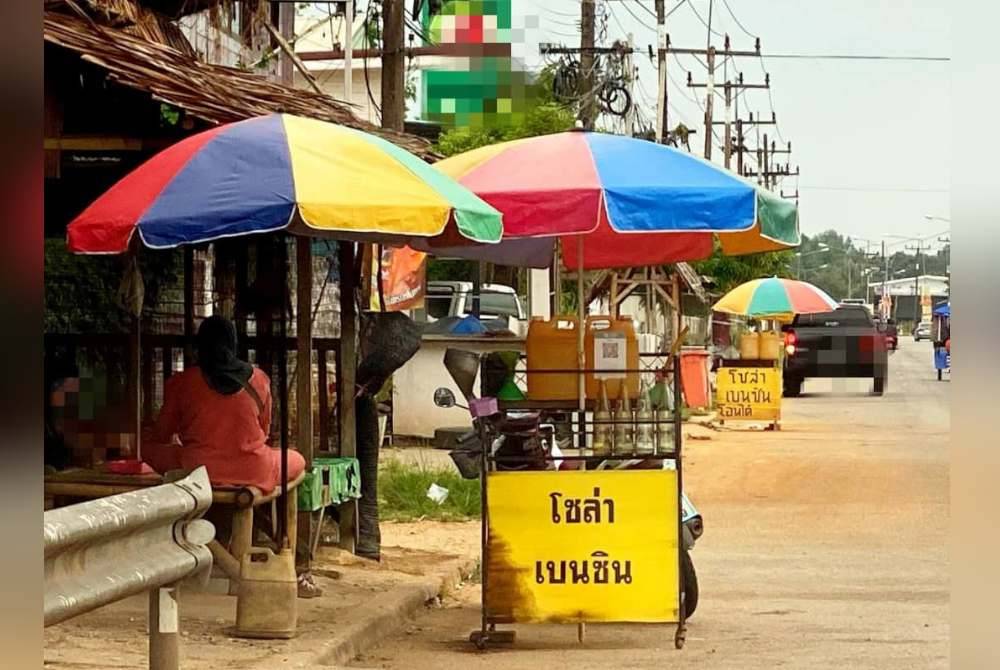Thai subsidised fuel sellers struggle after Malaysia's diesel subsidy cut
A Thai seller said this has caused him to lose half of his income and he now relied entirely on the sale of RON95 petrol.
SINAR HARIAN REPORTER
NARATHIWAT - Thai citizens who have been reaping significant profits from selling subsidised diesel smuggled from Malaysia are starting to feel the pinch due to the Malaysian government's subsidy targeting measures.
Many sellers of Malaysia's subsidised diesel at roadside stalls were now facing loss of income despite high demand, as many people in the country use four-wheel-drive vehicles.
A survey found that many sellers were complaining about the difficulty of obtaining smuggled fuel since the increase of diesel price in Malaysia by 56 per cent from RM2.15 per litre to RM3.35 per litre starting from June 10.
The reduced supply in the southern region of the country was believed to be due to the smaller profit margins caused by the new price set by the Malaysian government and strict enforcement measures.
The price per litre of diesel at petrol stations in Thailand was RM4.30, but roadside sellers offered smuggled diesel at a cheaper price of RM3.80 to RM4 per litre.
This meant that the price difference between smuggled diesel and the price in Malaysia was now only 65 sen compared to RM1.85, previously.
This did not yet include additional costs that sellers have to pay to suppliers (smugglers), which was about 20 sen per litre.
In other words, profits were dwindling and they needed to sell 100 litres of diesel to make a daily profit of RM45.
A survey covering the 40-kilometre stretch from Pekan Golok to Tak Bai found that nearly 100 stalls were selling smuggled fuel from Malaysia for local residents' use.
However, demand for RON95 petrol remained high as the subsidised fuel was still sold at RM2.05 per litre in Malaysia compared to RM5 in Thailand.
A fuel seller known as Mek, 65, said that the Malaysian government's measures have made it difficult to obtain fuel.
He said this situation has caused him to lose half of his income and he now relied entirely on the sale of RON95 petrol.
"Income has declined because usually, diesel is more popular here as many people use pickup trucks.
"I have been informed that supply from the neighbouring country is difficult because the price is now almost the same as in Thailand. The authorities' surveillance is also strict," he said.
Mek said that fuel smugglers were currently more cautious to avoid being caught by enforcement officers at the Malaysian border.
Another seller, Man, 52, who has been selling fuel from Malaysia for 20 years to make a living, said he now focused on petrol only because selling diesel was no longer very profitable.
"My income has dropped by almost 60 per cent compared to before. We really rely on selling subsidised fuel from Malaysia to sustain our lives," he said.
For him, the majority of people here relied on subsidised goods from Malaysia to sustain their lives.
He said that for decades, people in southern Thailand have depended on petrol and diesel from Malaysia.
"Not only petrol but other essential items like cooking oil, flour and sugar from Malaysia have long been used here and are easily available," he added.
Meanwhile, Kelantan Domestic Trade and Cost of Living Ministry director Azman Ismail said the department has stationed enforcement officers statically at several petrol stations near the Malaysia-Thailand border in the state to curb smuggling.
He said this involved stations in Bukit Bunga (Tanah Merah), Rantau Panjang (Pasir Mas) and Pengkalan Kubor (Tumpat).
"At the same time, static enforcement officers are also stationed at the main entry points into the country, namely at the Immigration, Customs, Quarantine and Security (ICQS) complexes in Bukit Bunga, Rantau Panjang and Pengkalan Kubor.
"As a result of this static enforcement, sales of fuel, especially diesel, have dropped significantly," he said.









